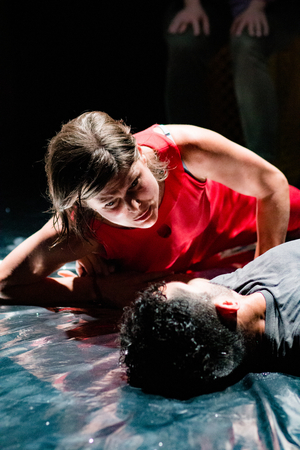Review: AT BLACK LAKE by Necessary Digression at The Tank

(Photo: Walls Trimble)
The thought of spending time at a lake for a reunion tends to conjure up images of relaxing on the dock, grilling food, and mixing drinks with conversation. Time at Black Lake, though, is more mercurial in nature, rippling across relationships. At Black Lake unfolds as an opaque memory/mystery play where time doesn't heal wounds--it scratches the surface until clues trickle like blood.
The night I saw this show at The Tank, the air conditioning struggled to cool the black box theater, which added some environmental realism to this presentational theatrical production, written by Dea Loher, translated (from German) by Daniel Brunet, and directed by Ashley Tata. The five performances comprised the United States premiere of the 100-minute (no intermission) show.
Four years ago, a tragedy happened at Black Lake involving the teenage children (Nina and Fritz) of two 40-something couples: Else (Heather Benton) and Johnny (Darrell Stokes), and Cleo (April Sweeney) and Eddie (Chris J. Cancel-Pomales). When the teens' parents reunite, they approach each other tentatively, like animals convening at a watering hole. Thirsty for answers about the tragedy and their children's relationship, they engage in a fair amount of chit-chat. In both form and content, the conversation is anything but casual; what's expressed on the surface hints at a dark twist of ties that bind both personal and business affairs.
From a directorial/script standpoint, the characters at times address each other (and the audience) in the present, referring to the past, while envisioning a future:
EDDIE: "I would kiss you love you now because it would be right now a??because it would be important now because it would have a meaning today why should we care what happens when this night is over another will come maybe we'll count and then always maybe not."
CLEO: "You've already said that you've already said that to me so often a??and I can't listen to it a??I just can't listen to it."
The deep one-level stage was covered in a rippling silver Mylar-like surface, which added an eerie luminous aquatic effect. One neon light tube overhead, along with some amber stage lighting, illuminated the four actors who made their way through 30+ scenes with primarily dialogue and not much stage business or set pieces.
The run-on nature of the characters' lines made it hard at times to frame them into a logical sequence, despite the actors' emotional delivery and intense facial expressions. When time was described as "A limboa?? from which there is no escape a limbo a??where the past never passes and the future never comes" I was grateful for a bit of metaphor because so much of the play is riddled with discordant monologues, fast blackouts-to-lights-up, and ominous music. I'm not opposed to one-set parental conflicts driving plays; God of Carnage (and more recently, After) both delivered taut storylines with minimal stage business. This play's austere staging forces the audience to cling to every word and glance in order to go beneath the surface.
Reader Reviews

Videos

